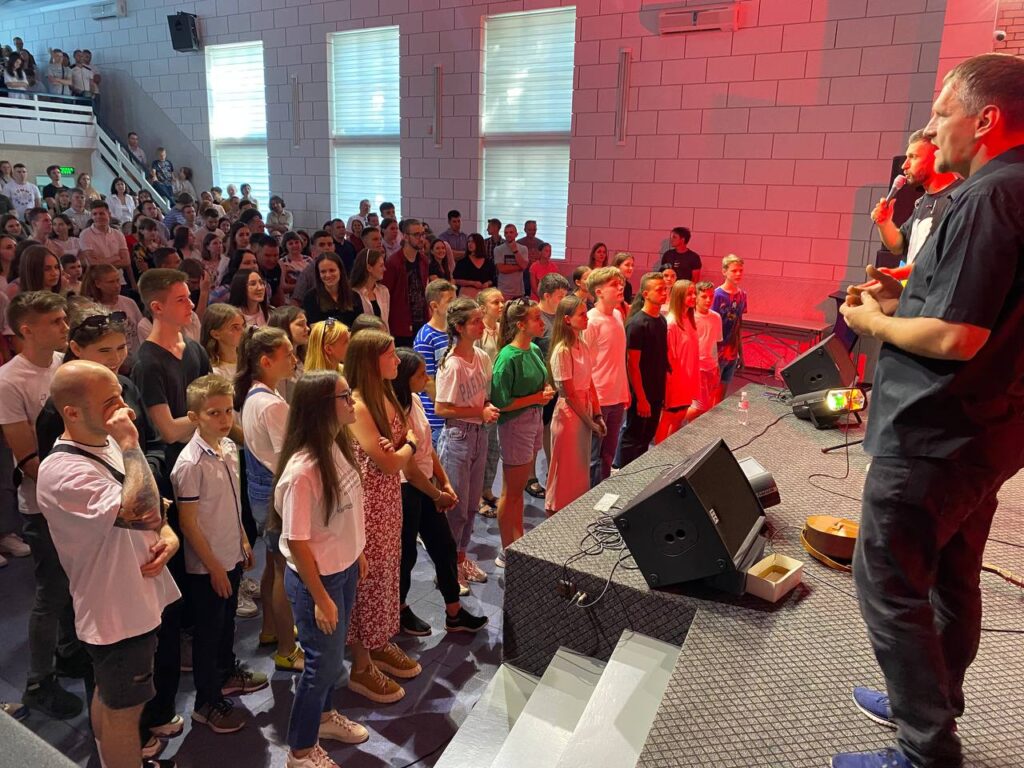
Interview with Oleksandr Ukhnal, a student of applied theology and youth leader at Salvation Church in Svitlovodsk, about the role of education in ministry and acceptance of those you minister to.
Can you tell us more about yourself and your ministry?
I accepted Christ 30 years ago, and, on September 1, 1993, became a church minister leading a home Bible study group.
It was not a church where I started working with teenagers but a charity for children from difficult families. My wife was already working there. In this way, God showed me the way to serve teens. I was kind of arguing with God because I did not see myself in that ministry. However, it’s already been eight years that I’ve been leading a ministry to teenagers.
Actually, considering that many young people leave Svitlovodsk for bigger cities for economic and other reasons, it is a combination of a ministry both to teenagers and youth. There is another leader we work together with. Teenagers have occupied a special place in my heart. Today, I don’t see my life without them.
What goal are you pursuing in your ministry to teenagers? What are you trying to create or change?
The desire of my heart is for the teenagers to become ministers who know Christ and accept people. In the summer, we conducted a training in evangelism. As a result, many of our teenagers got excited about studying. One needs to learn to accept people despite their flaws, wrong acts, conduct or decisions.
By the way, I am very grateful to the seminary faculty… Sometimes, they present one idea in a lecture and then assign us to read books, throwing light on other ideas. That is how our own perspective is shaped.
Actually, this is a problem of many children of believers. They often think as their parents think. But when you start asking questions such as “Why are you saved?”, “Why do you go to church?”, “Why do you worship?” it is important to hear their own answers rather than ready-to-use answers their parents, peers or popular bloggers would give.

How has your ministry changed during the war?
Our ministry has undergone drastic changes during the war indeed. We were especially active in the first six months of the war. Together with our youth and teenagers, we unloaded trucks, cooked and distributed food. Young people are always ready to get involved.
Actually, the war has changed our perception of our ministry… First, we evacuated people from Kharkiv. I did not travel there, but, due to numerous acquaintances among our brothers and sisters, we accompanied people to the border. The church was a network which managed to get self-organized. And ministers who did not directly communicate were doing many things together. The war has changed the mentality of the Ukrainian people and their treatment of evangelical churches. I don’t know a single church who would promote its own interests during wartime. We have just been ministering to our fellow men.
What prompted you to return to a classroom and become a student again?
When we take children to school, we want them to be taught by professionals. So, why should anyone teach at a church? God has provided us with talents we are expected to develop. In what way? By studying. When I just started leading a Bible study group, it was all based on enthusiasm. Later, I understood that I could not give people what I did not have. It prompted me to search for something new, to get filled in myself first. That is how I understood I needed to enroll in a seminary program.

Can you give examples of how your studies at UETS have practically impacted you and your ministry?
My studies at UETS have helped me to read the Bible correctly and prepare for preaching. My sermons are my relationship with Christ. It is not difficult to prepare a lecture. It is much more difficult to share what God wants you to share. So, I understood that one has to prepare a sermon in obedience to the Holy Spirit. This is what I aspire to. The Scriptures you read contextually point at acceptance and relationships.
Many courses I’ve taken at the seminary prompt me to change, change my ministry, change my attitude towards my ministry. Also, I understood how important it is to be physically present in a classroom as there are many things we discuss with my co-ministers after classes.
Also, I have noticed that my understanding of Christianity is like climbing a mountain. You ascend, reach a peak, but, in order to conquer another summit, you need to go down for a while.

Could you share a story of someone whose life was influenced by your ministry?
One girl from a Christian family attended our camp several times and occasionally came to our youth gatherings. Last year, she hesitated whether to go to the camp again or not. Eventually, I talked to her parents, and she did go.
On our last camp day, when we prayed for kids, this girl came up to one sister, and she prayed for her. Then I saw this girl walking after the prayer, and I could feel an urge to come up and pray for her as well. I did so, and it turned out that when praying, I was saying all the same things that our sister did just a little while ago (though I could not know what she prayed for earlier).
It impacted the girl so much that afterward, she started to attend church services and our youth gatherings on a regular basis. Once she told me: “You did so much for me!”
Sometimes, you think that you are not really doing anything special – you just accept, just listen, just talk, but it turns out that it can mean a lot to someone. It was important for me to hear this as it made me understand that my ministry is not in vain.

